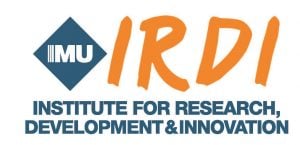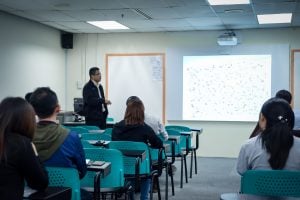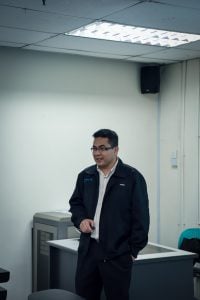The Centre for Cancer and Stem Cell Research of Institute for Research, Development and Innovation (IRDI) in collaboration with the School of Pharmacy, International Medical University (IMU) had successfully organised the third Translational Research Seminar titled Bringing Machine Intelligence to Malaysian Cancer Histopathology Research on 18 May 2018 at the IMU Bukit Jalil campus.  The speaker who deliberated this talk was A/Prof Mohammad Faizal Ahmad Fauzi from the Faculty of Engineering, Multimedia University, Cyberjaya. He received his Bachelor of Engineering in Electrical and Electronic Engineering from Imperial College London in 1999 and his Doctor of Philosophy in Electronics and Computer Science from University of Southampton in 2004. He continued to develop his research interests in the area of signal and image processing, pattern recognition, computer vision, and biomedical informatics. Mohammad Faizal is a Senior Member of the Institute of Electrical and Electronics Engineers (IEEE) and he is currently serving actively as the Chair of the IEEE Malaysia Section since January 2017.
The speaker who deliberated this talk was A/Prof Mohammad Faizal Ahmad Fauzi from the Faculty of Engineering, Multimedia University, Cyberjaya. He received his Bachelor of Engineering in Electrical and Electronic Engineering from Imperial College London in 1999 and his Doctor of Philosophy in Electronics and Computer Science from University of Southampton in 2004. He continued to develop his research interests in the area of signal and image processing, pattern recognition, computer vision, and biomedical informatics. Mohammad Faizal is a Senior Member of the Institute of Electrical and Electronics Engineers (IEEE) and he is currently serving actively as the Chair of the IEEE Malaysia Section since January 2017.

 Digital pathology is an emerging area in medicine whereby the disease information is generated from the digital glass slide after being managed and interpreted by the computer technology using digital advancements. It has resulted in better, faster, and cheaper diagnosis, prognosis, and prediction of cancer and other important diseases. One of the most promising avenues in digital pathology is whole slide imaging, which is a technology of scanning the conventional physical glass slides in order to produce digital slides that can be analysed by the computer. Another area gaining a lot of interest in digital pathology is histopathological analysis of tissues, the study of the signs of the disease using the microscopic examination of a biopsy or surgical specimen on glass slides. Computer algorithms are subsequently developed to assist pathologists from cell detection and counting, to tissue classification and cancer grading which will enable the pathologists to channel their much needed medical expertise in other important works. To date, research in histopathological image analysis has yet to take off in Malaysia, with very few work currently reported in this field.
Digital pathology is an emerging area in medicine whereby the disease information is generated from the digital glass slide after being managed and interpreted by the computer technology using digital advancements. It has resulted in better, faster, and cheaper diagnosis, prognosis, and prediction of cancer and other important diseases. One of the most promising avenues in digital pathology is whole slide imaging, which is a technology of scanning the conventional physical glass slides in order to produce digital slides that can be analysed by the computer. Another area gaining a lot of interest in digital pathology is histopathological analysis of tissues, the study of the signs of the disease using the microscopic examination of a biopsy or surgical specimen on glass slides. Computer algorithms are subsequently developed to assist pathologists from cell detection and counting, to tissue classification and cancer grading which will enable the pathologists to channel their much needed medical expertise in other important works. To date, research in histopathological image analysis has yet to take off in Malaysia, with very few work currently reported in this field.
The focus of the talk was to highlight some of the efforts done by Mohammad Faizal in bringing machine intelligence into histopathology research in the Malaysian context. These include brain tumour (glioblastoma) and metastases classification in neuropathology intraoperative diagnosis, blood cancer (follicular lymphoma) grading, breast cancer detection and grading, as well as tumour budding (detachment of individual or small clusters of up to five tumour cells from the main tumour mass and invade into the surrounding environment) detection in colorectal cancer.
This talk was truly an eye-opener as it provided insights to the audience on how digital advancements could inevitably serve as an impetus to bring the medical world to another level.
Related articles: Why WAIT – Joslin’s Diabetes Breakthrough with Lifestyle Intervention for Diabetes UK Researcher Speaks on Targeting the Hypoxic Fraction of Tumours









